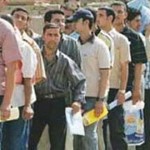Economy: The Market But at What Cost?
A Decade in Power: Syria under Bashar al-Assad’s Rule
Cash dispensers, the latest car models, fancy restaurants and expensive clothes shops have become common sights in some of the posher neighborhoods of Damascus. But these glitzy scenes do not reflect the whole reality of the major economic changes ushered in by Bashar.
Outside the pockets of conspicuous consumption, poverty is growing a pace, with inflation and unemployment making Syrian increasingly discontent. In 2000, Bashar took over a country still largely following a soviet style centralised socialist economy. Lack of accountability, corruption and misuse of natural and human resources were rampant.
The wealth of the country was concentrated in the hands of the Assad family and officials close to it. The country ranked very low in the human development index. Assad also inherited a large inefficient public sector with low productivity.
Ten years later, Syria boasts many private banks, it has attracted foreign investments and opened its borders to trade. The country has also launched a stock market for the first time in its recent history. Nevertheless, the new found wealth has yet to trickle down.








